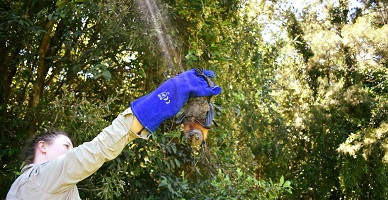Doctor Melissa Walker
Candidature
Graduate PhD 2023
Thesis title
Thermoregulatory physiology, energetics, and behaviour of free-living grey-headed flying-foxes, Pteropus poliocephalus, in response to natural variation in thermal conditions
Project description
Energy is fundamental to life. Intrinsic factors, such as the maintenance of a positive energy balance, govern how energy is regulated by an individual. Extrinsic factors, such as air temperature and food availability, govern the amount of energy available in the environment. In order to defend the high body temperature required for optimal levels of function, mammals must strategically regulate their energy expenditure, and do so in response to changes in the environment. This project investigates the intrinsic and extrinsic factors underpinning energetics of grey-headed flying-foxes, Pteropus poliocephalus (Fig. 1).
is fundamental to life. Intrinsic factors, such as the maintenance of a positive energy balance, govern how energy is regulated by an individual. Extrinsic factors, such as air temperature and food availability, govern the amount of energy available in the environment. In order to defend the high body temperature required for optimal levels of function, mammals must strategically regulate their energy expenditure, and do so in response to changes in the environment. This project investigates the intrinsic and extrinsic factors underpinning energetics of grey-headed flying-foxes, Pteropus poliocephalus (Fig. 1).

Figure 1. A grey-headed flying-fox, Pteropus poliocephalus.
Tree roosting flying-foxes are highly exposed to a range of environmental conditions, and employ a particular sequence of behavioural and physiological responses to defend body temperature. Strategic changes to these responses may offer important energetic savings. For example, a reduction in activity and body temperature while resting (i.e. torpor) is an important mechanism employed by smaller bats, and many other mammals, to reduce their daily energy requirements (e.g. when food is unavailable or foraging costs are high).
Recent advances in body temperature monitoring and body acceleration sensing allow the spatial movements of flying-foxes to be annotated with energy costs. Furthermore, these technological advance allow flying-foxes to be monitored under natural conditions. By monitoring intrinsic and extrinsic factors governing flying-fox energetics, we can begin to accurately describe flying-fox ecology under natural conditions, and predict how energetics affect the behaviour and movements of flying-foxes over space and time.
Supervisors
Dr. Christopher Turbill, Dr. Justin Welbergen and Dr. Jessica Meade
Funding
This research is supported by an ARC Discovery Project awarded to Dr Justin Welbergen, Dr Christopher Turbill and Dr David Westcott to develop a mechanistic understanding of the movement ecology of flying foxes.
Publications
Yabsley SH, Meade J, Hibburt TD, Martin JM, Boardman WSJ, Nicolle D, Walker MJ, Turbill C, Welbergen JA, (2022) 'Variety is the spice of life: Flying-foxes exploit a variety of native and exotic food plants in an urban landscape mosaic', Frontiers in Ecology and Evolution, vol.10, Article no.907966
Walker MJ, Dorrestein A, Camacho JJ, Meckler LA, Silas KA, Hiller T, Haelewaters D, (2018) 'A tripartite survey of hyperparasitic fungi associated with ectoparasitic flies on bats (Mammalia: Chiroptera) in a neotropical cloud forest in Panama', Parasite, vol.25, p 19